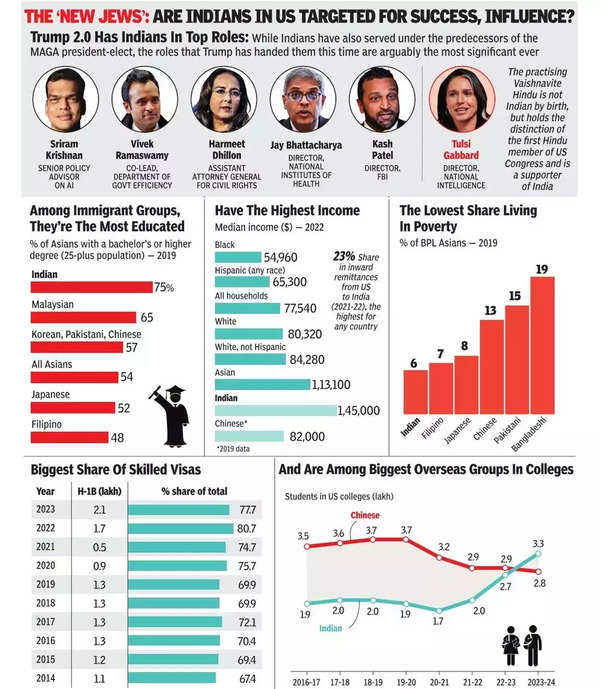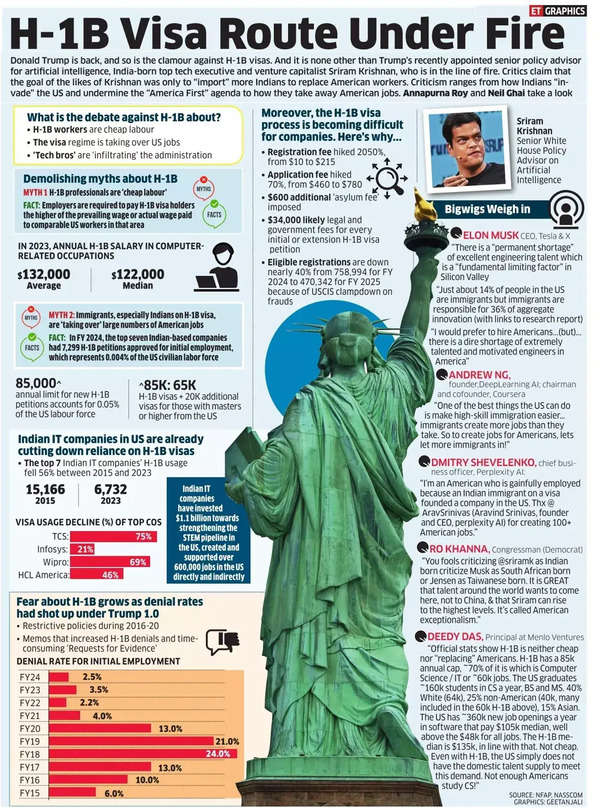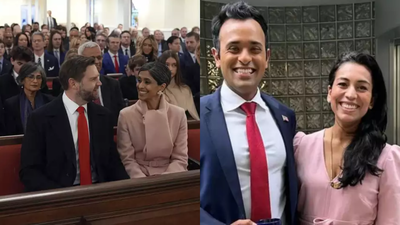As Usha Vance stood beside her husband, Vice President JD Vance, during his historic inauguration, she exuded quiet confidence, her sari-clad presence a vivid marker of a changing America. But if you peered into the murkier corners of MAGA’s digital ecosystem that day, you’d find something far uglier than the inauguration festivities.
“Christ is King, not some stinky Indian idol,” a MAGA-aligned commentator snarled online. Another chimed in with, “Will there be a cow in the White House soon?” These crude attacks weren’t just casual trolling—they were a reflection of a deeper discomfort with Usha Vance’s Hindu faith, a simmering resentment among segments of MAGA toward high-profile Indian-Americans who don’t fit the Christian nationalist mold.
It’s not just Usha. Vivek Ramaswamy, the biotech entrepreneur-turned-political firebrand, and Sriram Krishnan, the Silicon Valley techie now advising Trump on artificial intelligence, have also been in the crosshairs. Despite their policy alignment with MAGA’s cherished ideals—free markets, innovation, and an America-First approach—they remain outsiders in the movement. Their sin? Being unapologetically Hindu, visibly Indian, and symbolizing a multicultural America that MAGA’s core supporters fear is slipping away.
Racist Attacks Against Usha Vance

Usha Vance was born and raised in a Hindu family, embracing the religion’s rich traditions and values.
Usha Vance, the first Indian-American Second Lady of the United States, epitomizes the immigrant success story that politicians love to parade when it suits their narratives. A Yale-educated attorney and mother of three, she is a testament to America’s melting pot. But for MAGA’s more nativist wings, Usha’s Hindu identity is a red flag.
“I thought Vance was a Christian,” read one comment, dripping with righteous indignation, as if interfaith marriage was the harbinger of the apocalypse. Others labeled her beliefs “pagan idolatry,” turning centuries-old evangelical hostility toward Hinduism into a 21st-century meme war. Beneath the snark and disdain lies a broader discomfort: a worldview where non-Christian religions, especially one as visually rich and philosophically pluralistic as Hinduism, are incomprehensible and, therefore, threatening.
Prominent Indian-Americans in Trump’s Ambit

MAGA’s relationship with Indian-Americans is, to put it politely, complicated. On one hand, Donald Trump has strategically elevated several high-profile desis into key positions, making them ambassadors of a diverse MAGA 2.0. On the other hand, the nativist undercurrent within MAGA often bristles at their presence.
- Kash Patel, Trump’s bulldog in the fight against the so-called “deep state,” has become a polarizing figure. Equal parts folk hero and villain, Patel’s aggressive approach to national security has made him a darling of MAGA’s hardcore base, even as whispers about his heritage linger in the fringes.
- Dr. Jay Bhattacharya, the Stanford professor who loudly opposed COVID-19 lockdowns, has been embraced as the intellectual backbone of MAGA’s pandemic skepticism. He’s proof that desi academics can still dominate a debate when handed the mic.
- Sriram Krishnan, the Silicon Valley darling, was tapped to shape Trump’s AI policy—a sign of the administration’s grudging acknowledgment that America’s future competitiveness hinges on talent, regardless of ancestry.
- Tulsi Gabbard, while not Indian-American, is a Hindu who often gets honorary desi status. Her appointment as Director of National Intelligence feels almost like a nod to MAGA’s internationalist ambitions, even as it makes the evangelical right queasy.
- Vivek
Ramaswamy , MAGA’s golden child of economic policy, remains a paradox: a darling for his brash anti-woke rhetoric but suspect for his unapologetic Hinduism. He was recently dropped as co-lead of DOGE, making many wonder if his race played a part.
These figures underscore Trump’s calculated attempt to woo the Indian-American demographic—a group with outsized clout in technology, academia, and finance. But their inclusion also sparks fierce resistance among MAGA’s nativists, who view them as emblematic of an America they no longer recognize.
The Sriram Krishnan Controversy
When Trump appointed Sriram Krishnan as Senior Policy Advisor for Artificial Intelligence, the move was hailed as a victory for pragmatism—until Laura Loomer and her ilk showed up. The far-right commentator accused Krishnan of betraying Trump’s “America First” ethos, claiming that his support for immigration reforms like removing country caps on green cards would disadvantage American workers.
“Another tech bro taking over America,” sneered one tweet, weaponizing the model minority stereotype. MAGA’s digital trolls weren’t just attacking Krishnan’s policies—they were signaling their discomfort with his very presence. After all, nothing says “threat to white Christian dominance” quite like a brown immigrant revolutionizing the way America leads in global AI innovation.
Vivek Ramaswamy and the Limits of Inclusion
If MAGA were a frat, Vivek Ramaswamy would be the overachieving pledge who parties harder than the brothers and aces every exam, yet still gets left out of the group photo. Ramaswamy’s commitment to free markets and his sharp critiques of woke ideology make him a natural fit for MAGA, but his Hindu identity complicates things. Evangelical Christians, a core MAGA constituency, view Hinduism with deep skepticism. Ramaswamy’s references to the Bhagavad Gita have been criticized as relativistic—a dangerous departure from the evangelical insistence on biblical exclusivity. He’s the perfect candidate on paper, but in practice, his unapologetic Hinduism and Indian heritage keep him at arm’s length.
The Pagan Problem
At the heart of MAGA’s discomfort with figures like Usha Vance, Vivek Ramaswamy, and Sriram Krishnan lies what some evangelical leaders have long referred to as “The Pagan Problem.” Hinduism, with its polytheistic traditions, vibrant rituals, and richly symbolic deities like Ganesha and Kali, has historically been framed by Christian conservatives as idolatrous and antithetical to Western values. This narrative, rooted in colonial-era missionary rhetoric, still permeates parts of the MAGA movement. For evangelical Christians, who form a significant portion of MAGA’s base, the visual and philosophical differences of Hinduism evoke suspicion and alienation. These deep-seated biases fuel the movement’s broader struggle to embrace Indian-Americans who refuse to downplay their heritage or faith, viewing them instead as symbols of an increasingly pluralistic America they fear losing control over.
Are Indian-Americans the New Jews of America?

Indian-Americans are increasingly drawing comparisons to Jewish-Americans of the 20th century: influential, successful, and often resented. “Our clout comes from the fact that the Indian community constitutes what I call the ‘next Jews’ of America,” said Prof. Jagdish Bhagwati in 2000, and his words have only grown more prescient.
Indian-Americans are the highest-earning and most educated ethnic group in the US. Their dominance in Silicon Valley—Sundar Pichai (Google), Satya Nadella (Microsoft), Arvind Krishna (IBM)—and leadership in academia, medicine, and politics mirror the Jewish-American ascent in earlier decades. But with success comes envy and suspicion, particularly in an era of economic insecurity and resurgent nationalism.
Admiration and Resentment: The Duality of Success
Indian-Americans embody the American Dream, but that dream comes with a price. Just as Jewish-Americans faced accusations of wielding too much influence, Indian-Americans now navigate similar waters. MAGA, for all its professed meritocratic values, struggles to reconcile its admiration for their achievements with a visceral resentment of their visibility and cultural distinctiveness. MAGA’s relationship with figures like Usha Vance, Sriram Krishnan, and Vivek Ramaswamy exposes its identity crisis. The movement wants to project an image of inclusion and modernity but remains tethered to a foundation of Christian nationalism and ethnocentrism.




